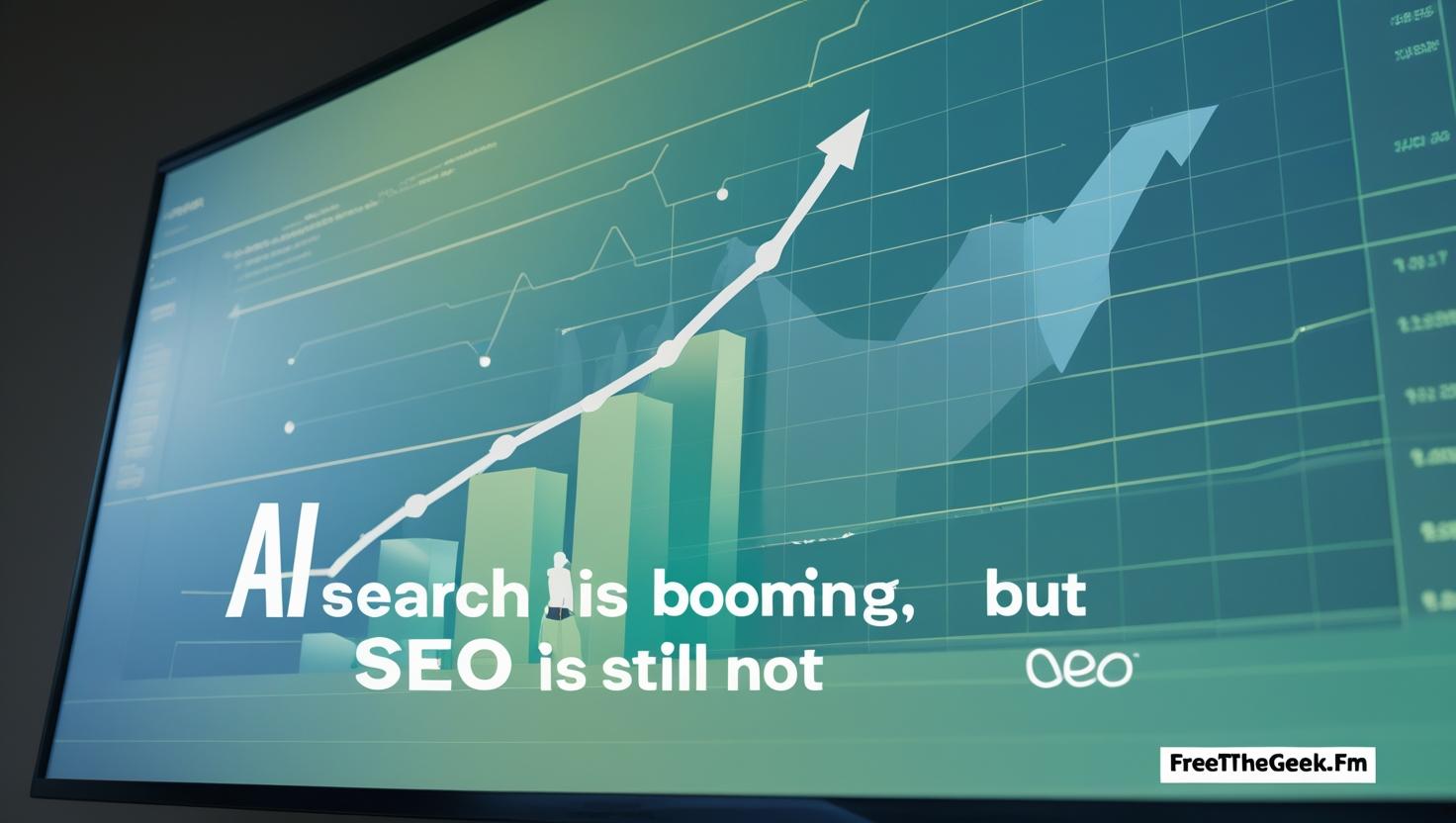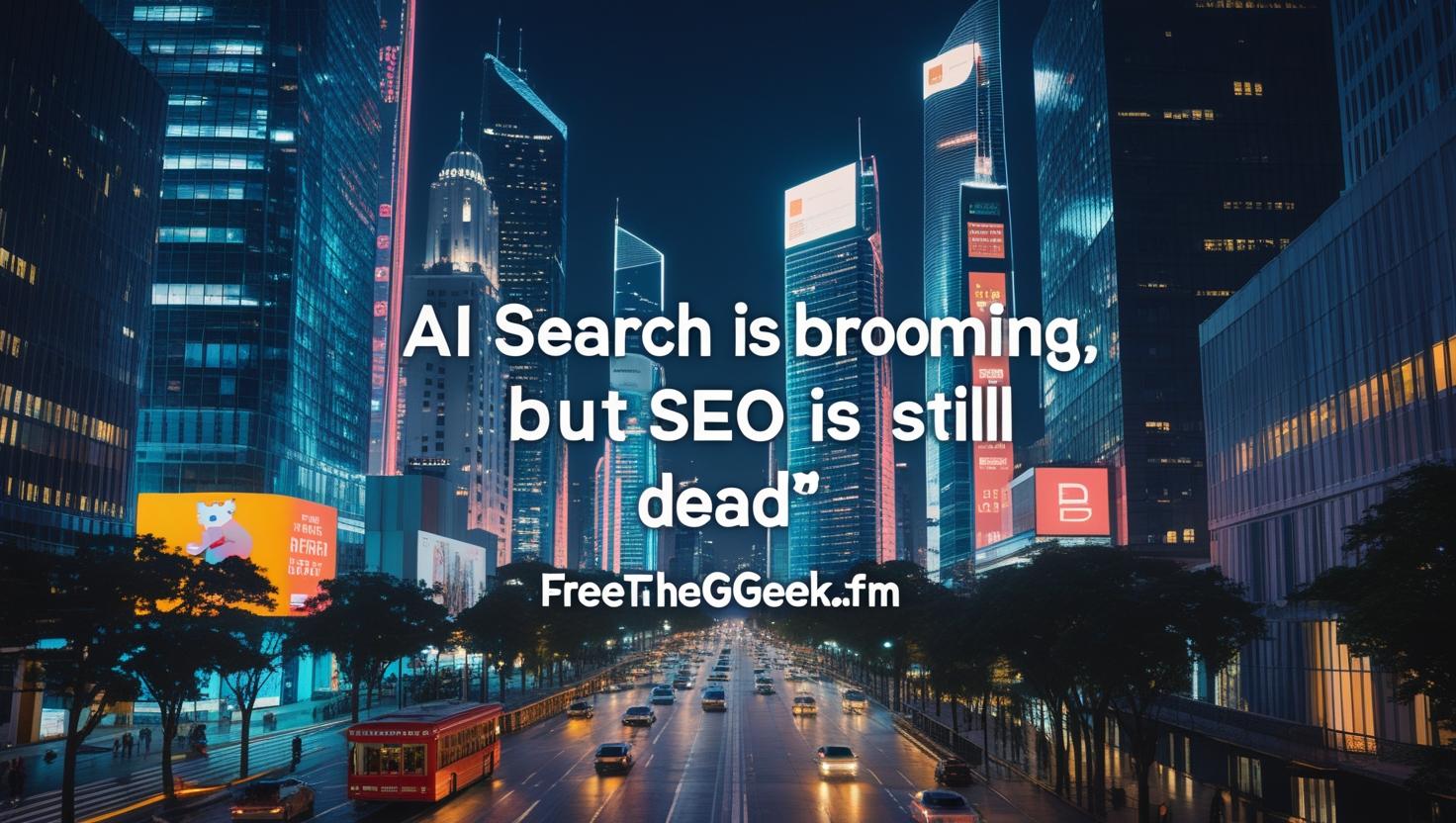Introduction
In an era dominated by AI-powered search engines like ChatGPT, Perplexity, and Gemini, many marketers wonder: Is traditional SEO dead? The answer is a resounding no. While AI search is booming and reshaping user behavior, SEO is evolving—not disappearing.
In fact, 2025 is proving to be a pivotal year where businesses must blend traditional SEO principles with AI-aware content strategies. This article explores the reasons behind AI’s rise in search, its implications for SEO, and how you can future-proof your content for the next generation of search.
AI Search: What’s Driving the Boom?
AI-powered search is becoming mainstream due to several technological and behavioral shifts:
Key Drivers of AI Search Growth
- Natural Language Processing (NLP): Tools like OpenAI’s ChatGPT and Google’s Gemini use NLP to understand complex queries.
- Conversational Search: Users now expect to “talk” to search engines as if interacting with a human.
- Speed and Relevance: AI delivers instant, tailored answers with context-aware capabilities.
- Multi-modal Integration: AI can handle text, voice, images, and even video as part of search.
Popular AI Search Tools in 2025
| Tool | Features | Use Case |
|---|---|---|
| ChatGPT Search | Conversational + citation-based | Research, summaries |
| Perplexity AI | Fast, reference-rich results | Real-time answers |
| Google SGE | Blended AI + classic search | Shopping, news, snippets |
| Bing Copilot | Microsoft-integrated assistant | Enterprise, web search |
Despite these advances, the structure and logic behind ranking, visibility, and authority still matter—which brings us back to SEO.
Why SEO Is Still Very Much Alive

Even with the AI search boom, SEO remains the backbone of digital visibility for several reasons:
1. Content Still Needs to Be Found
AI doesn’t generate answers from a vacuum. It pulls from indexed, structured, high-quality content. Without well-optimized content, your site won’t be chosen as a source.
2. Web Traffic Still Exists
Organic traffic from Google’s classic results, snippets, and image/video searches remains a top traffic source for most businesses.
3. Brand Authority Matters
AI models prioritize trusted sources, which are often defined by domain authority, backlink profiles, and consistent content relevance—all core SEO metrics.
4. AI is Learning From SEO Signals
AI engines often weigh content freshness, E-E-A-T (Experience, Expertise, Authoritativeness, Trustworthiness), internal linking, and page structure—all classic SEO principles.
AI vs Traditional Search: A Comparison Table
| Feature | Traditional SEO Search | AI-Powered Search |
|---|---|---|
| Query Style | Keywords, phrases | Conversational, contextual |
| Result Type | Web page links | Direct answers, summaries |
| Content Source | Indexed websites | Top-ranked, structured content |
| Ranking Factors | Backlinks, keywords, on-page SEO | Authority, clarity, semantic value |
| User Behavior | Clicks, scrolling | Engagement with generated answers |
Adapting Your SEO for AI Search
To stay competitive, marketers must adapt SEO strategies to align with AI-powered interfaces.
Actionable Tactics:
- Focus on Topical Authority: Cover all related subtopics in-depth to become a trusted source.
- Create AI-Snippet-Friendly Content: Use concise, structured answers that AI can pull into summaries.
- Leverage Schema Markup: Help AI and traditional search engines better understand your content.
- Optimize for Multi-intent Queries: Blend informational, transactional, and navigational keywords.
AI-Friendly Content Optimization Techniques
1. Write Like You’re Explaining to a Human
AI favors clear, jargon-free, helpful content. This means:
- Short paragraphs
- Bullet points and lists
- Clear headings (H2, H3)
- Defined question-answer formats (perfect for featured snippets)
2. Use Semantic SEO
Rather than stuffing exact-match keywords, focus on entities, concepts, and relationships.
Example:
Instead of:
“Best iPhone 15 Pro Max Case” repeated 10 times
Use:
“Protective case for iPhone 15 Pro Max,” “shockproof phone covers,” “MagSafe-compatible options”
3. Optimize for AI Citations
- Include sources, data, and stats with outbound links to credible sites.
- Add author bios with credentials.
- Use FAQs, how-tos, and definitions.
The Role of Backlinks and Domain Authority in 2025
Are Backlinks Still Relevant?
Yes—but now quality trumps quantity more than ever. AI search models prefer:
- Natural backlinks from relevant domains
- Mentions in trusted sources (news, government, high DA blogs)
- Contextual placement over sidebar/footer links
How to Build Authority:
- Guest posting on relevant sites
- Digital PR campaigns
- Collaborations and influencer mentions
- Expert roundups and podcasts
Search Intent and Semantic SEO in the Age of AI
Understanding user intent is more vital than ever. AI tools prioritize content that best matches the reason behind the query, not just the words used.
4 Types of Intent:
| Intent Type | Example Query | Content Strategy |
|---|---|---|
| Informational | “What is blockchain?” | Blog posts, guides, videos |
| Navigational | “Ahrefs pricing page” | Optimized site architecture |
| Transactional | “Buy laptop under $1000” | Product pages, reviews |
| Commercial | “Best CRM tools for startups” | Comparisons, roundups, CTAs |
SEO Tools That Embrace AI
Several modern SEO tools are integrating AI to help adapt to new demands:
| Tool | AI Features | Use Case |
|---|---|---|
| Surfer SEO | NLP-based content scoring | On-page optimization |
| Clearscope | AI-assisted keyword grouping | Content briefs |
| Jasper | AI copywriting with SEO tips | Blog, ad, and web copy |
| Semrush AI | Topic clustering, competitor AI | Competitive analysis |
Future Trends in AI and SEO Integration
1. Search Generative Experiences (SGE) by Google
These are AI-powered overviews within Google that show summaries above traditional results. Content that’s structured, cited, and trustworthy will appear in SGE panels.
2. AI-Generated Meta Tags and Titles
AI can now auto-generate titles/descriptions, but human-edited versions often perform better. SEO specialists should balance automation with brand voice.
3. Voice Search Optimization
AI assistants like Siri and Alexa continue to rely on structured SEO content—especially FAQs and local SEO—to answer voice queries.
4. Zero-Click Results
AI may reduce organic click-throughs, but brand visibility, answer credibility, and traffic from deeper queries are still strong SEO benefits.
Conclusion
AI search is undoubtedly reshaping the digital landscape, but SEO is far from dead. Instead, it’s evolving—and those who evolve with it will thrive.
By adapting your content strategy to include semantic structure, AI-friendly formats, and user-focused intent, you’ll not only maintain visibility in traditional search but also increase your chances of being cited by AI tools.
Frequently Asked Questions (FAQ)
1. Is SEO still worth investing in 2025?
Absolutely. SEO remains a core traffic, credibility, and brand-building tool—even as AI search grows.
2. How does AI search impact traditional keyword usage?
AI understands context better than exact-match keywords. Focus on semantic keywords and user intent.
3. Will AI replace SEO professionals?
No, but it will reshape their roles. SEOs will focus more on strategy, content structure, and user behavior analysis.
4. How do I optimize content for AI search engines like ChatGPT or Perplexity?
Use structured, high-quality content with clear answers, citations, and topical depth.
5. Are backlinks still necessary in AI-dominated search?
Yes. Backlinks from authoritative, relevant sources still signal credibility and help AI models rank your content.
6. What is SGE in Google Search?
Search Generative Experience (SGE) is Google’s AI-generated snippet at the top of search results. Optimizing for SGE means clear, fact-rich, authoritative content.
7. How can I check if my content is AI-search friendly?
Use tools like SurferSEO, Semrush, or Clearscope, and test visibility on platforms like Perplexity and ChatGPT with your focus questions.
